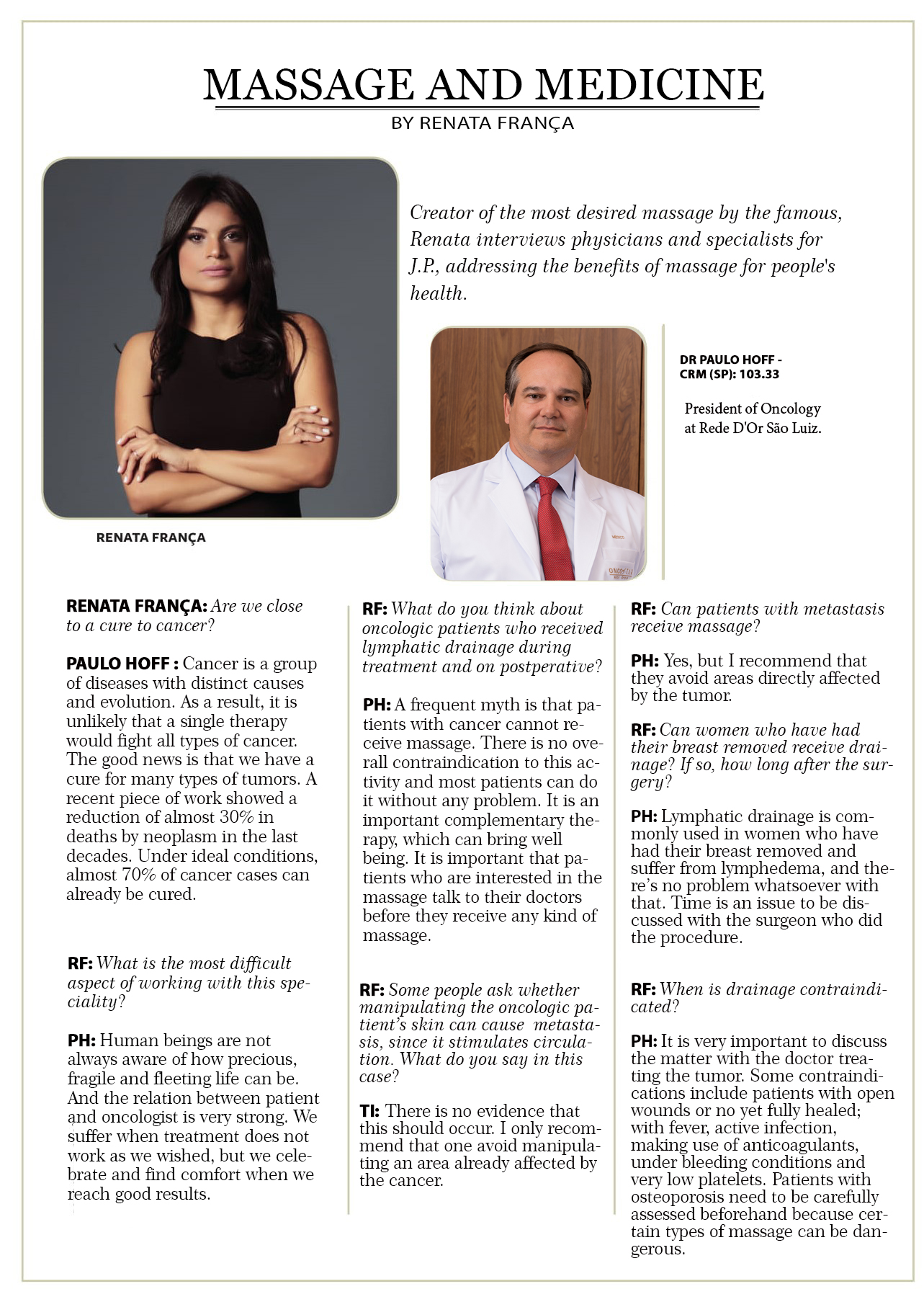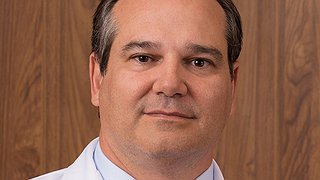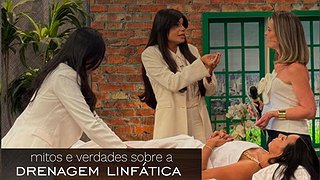
Massage and Medicine by Renata França
Creator of the massage which is the most desired by the famous, Renata interviews physicians and specialists for J.P. magazine, addressing the benefits of massage for people’s health.
DR. Paulo Hoff
President of Oncology at Rede D'Or São Luiz.
1- Renata França: Dr. Paulo Hoff, how did you get to chose oncology? Paulo Hoff: I’ve always been very curious about oncology, also because I had many cancer cases in my family. During my training, I was fascinated with the opportunity to help people by assisting them with their serious diseases and, at the same time, to be able to take part in the development of a new medical area. There was and there still is a huge need to generate knowledge via research, in order to help our patients. Modern oncology is one of the most active areas in science.
2- RF: Are we close to the cure to cancer? PH: Cancer is a group of diseases with distinct causes and evolution. As a result, it is unlikely that a single therapy would fight all types of cancer. The good news is that there is a cure for many types of tumors. A recently published piece of work clearly showed the evolution of treatments with a reduction of almost 30% in deaths by neoplasm in the last decades. Under ideal conditions, almost 70% of cancer cases can already be cured. Of course we still have to do a lot more and I believe those figures will continue to improve quickly. The current trend is the customization of oncology, with individual treatments based on body genetic features and on each patient’s tumor. Advances in this area are impressive, including new types of treament such as imunotherapy, for example.
3- RF: What is the most difficult aspect of working with this speciality, which often deals with the finitude of life? PH: Human beings are not always aware of how precious, fragile and fleeting life can be. In general, physicians are faced with this reality more intensely than most people, and that is not easy. The relation between patient and oncologist is very strong and intense. We suffer when treatment does not work as we wished. On the other hand, we celebrate and find comfort when we reach good results.
4- RF: Is cancer prevention possible, especially at this time we are living? PH: It is impossible to prevent cancer completely, but we can reduce the risks. Relatively simple measures help to avoid the appearance of tumors, measures which we regard as primary prevention. Avoiding tobacco use (not smoking), not drinking excessively, practising exercises regularly, having a healthy diet, avoiding excessive exposure to the sun and practicing safe sex are some of the most efficient measures. Some tumors are possible to prevent through vaccination, such as uterine cervix and oropharynx which are related to HPV.
There are also measures considered secondary prevention. As such, we look for pre-malignant lesion or even tumors at a initial stage, when the cure is easier. This category includes Pap smears and breast exams for women; prostate for men; intestine for both. Certain patients can need other types of monitoring, particularly when there’s a significant family track record or exposure to risk factors, such as tobacco. I recommend that each person discuss with their doctor what exams to take and at what age they should start taking them.
5- RF: A frequent doubt coming up in my courses is whether oncologic patients can receive lymphatic drainage during treatment and on postoperative. PH: A frequent myth is that patients with cancer cannot receive massage. There is no overall contraindication to this activity and most patients can do it without any problem. It is an important complementary therapy, which can bring well being. Most importantly is that patients interested in this massage talk to their doctors before they receive any kind of massage.
6- RF: Some people ask whether manipulating the oncologic patient’s skin can cause metastasis, since it stimulates circulation. What do you say in this case? PH: There is no evidence that this should occur. I only recommend that one avoid manipulating an area already affected by the cancer.
7- RF: Can patients with metastases receive massage? PH: Yes, but I recommend that they avoid areas directly affected by the tumor.
8- RF: Can women who have had their breast removed receive drainage? If so, how long after the surgery? PH: Lymphatic drainage is commonly used in women who have had their breast removed and suffer from lymphedema, and there’s no problem whatsoever with that. Time is an issue to be discussed with the surgeon who did the procedure.
9- RF: When is drainage/massage contraindicated? PH: Since each patient has distinct characteristics, it is very important to discuss the matter in advance with the doctor treating the tumor. Some contraindications include patients with open wounds or not yet fully healed; with fever, active infection, making use of anticoagulants, bleeding conditions and very low platelets. Patients with osteoporosis need to be carefully assessed beforehand because certain types of massage can be dangerous in such cases.


